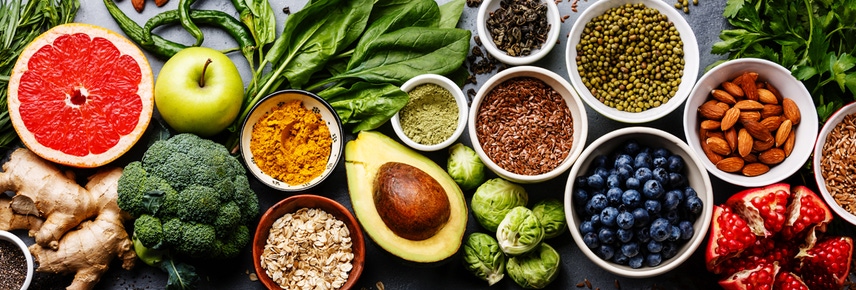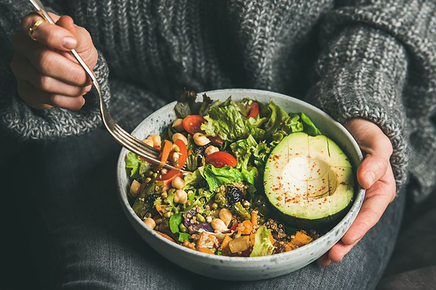
How to get the nutrients you need this winter
In winter the days are╠řmuch╠řshorter,╠řit can be hard to get out of bed in the morning╠řand╠řkilojoule-heavy╠řmeals suddenly look very appealing. Worse, winter often means╠řsniffles, sore throats, coughs╠řand even the flu. But what you eat can help╠řkeep╠řyour immune system╠řstrong and╠řward off those╠řpesky winter╠řwoes.╠ř╠ř
─ű├╩Á╝║Ż╠řdietitian Charlotte Moor╠řshares her top tips to╠řget the╠řnutrients╠řyou╠řneed╠řeach day.╠řAnd,╠řto╠řmake it╠řeven╠řeasier, weÔÇÖve got two great╠řvegetarian meal plans that deliver╠řa wellness punch.╠ř
Helping your immunity
Got a sniffle? You might be tempted to reach for the vitamin C tablets,╠řbut there is a╠řbetter option.╠řCharlotte╠řsays you can easily╠řmeet your╠řvitamin C╠řneeds╠řfrom╠řfoods╠řthat are readily available in winter╠řsuch as potatoes, citrus,╠řkiwifruit and broccoli,╠řHowever,╠řwe donÔÇÖt need as much╠ř╠řas╠řyou might think.╠řAnd, importantly, immunity╠řis╠řabout╠řmuch╠řmore than vitamin C alone. For an immunity squad thatÔÇÖs really╠řgot your back,╠řyouÔÇÖll need╠řfoods rich in╠řvitamins A, B, C,╠řD╠řand E,╠řall of╠řwhich help your body fight infections╠řand keep you well in winter.╠ř╠ř
And itÔÇÖs not just vitamins. Minerals such as╠řiron╠řand╠řzinc, as well as the less well-known╠řselenium,╠řare also vital for your natural defences╠řÔÇô╠řthey help with╠řimmune cell growth.╠ř╠ř
Eating for energy
In that╠řdreaded╠řwinter╠řhibernation mode?╠řThe colder months can, for many people, mean╠řa slump in energy.╠řBut╠řCharlotte╠řsays╠řa number of everyday nutrients can help put╠řa spring back in your step.╠ř
Iron╠řis╠řimportant. ItÔÇÖs essential for moving oxygen around the body╠řso our cells can produce the energy we need to get through the day. Yet, worldwide, iron╠řis╠řthe╠ř╠řdietary deficiency╠řÔÇô╠řand almost a quarter of women╠ř.╠ř╠ř╠ř
HereÔÇÖs a╠řtip╠řÔÇô iron╠řis more when eaten with╠řvitamin C-rich╠řfruits and vegetables,╠řso itÔÇÖs╠řreally important╠řtoaim for at least 5 serves of vegetables and 2 serves of fruit a day.╠ř╠ř
Other important vitamins include╠řB12,╠řa nutrient that helps keep the bodyÔÇÖs nerve and blood cells healthy and helps make DNA, the genetic material in all cells.╠řVitamin B12 also helps prevent a type of╠řanaemia╠řcalled╠ř╠řthat makes people tired and weak.╠řVitamin╠řB3╠řunlocks energy from food. Vitamin╠řB6╠řis needed for╠řenzyme╠řreactions, is╠řinvolved in metabolism╠řand helps╠řmake much-needed╠řenergy.╠ř╠ř
And if youÔÇÖre making the most of that fabulous boost in energy, and╠řnow╠řyour╠řmuscles feel like theyÔÇÖre seizing up,╠řmagnesium╠řrich foods╠řmay╠řhelp╠řkeep you moving.╠ř╠ř
Nutrients for strong bodies
Healthy bodies come from healthy diets.╠řBut how do we know what we need?╠ř╠ř
Calcium╠řis needed for╠řstrong bones and teeth, but thatÔÇÖs just the start.╠řCharlotte╠řsays itÔÇÖs╠řa rockstar mineral thatÔÇÖs also╠řessential╠řfor good muscle function╠řand╠řa healthy nervous system.╠ř╠řare low in calcium. The body cannot make its own calcium, so itÔÇÖs important to ensure youÔÇÖre getting enough in your diet. Similarly,╠řpotassium╠řwhich also plays a role╠řin╠řnerve function, is not produced by the body╠řand can be found in a variety of╠řfruits╠ř(bananas, oranges, melon, dried fruits), veg╠ř(sweet potato, potato, broccoli, leafy greens, legumes), grain foods and milk.╠ř
Subscribe to Wholicious Living to stay up-to-date with the latest health and nutrition advice.
Other important nutrients
Winter getting you╠řdown?╠řFolate╠řmight help. It╠řnot only╠řplays a key role in the formation of╠řhealthy red blood╠řcells,╠řit╠řalso╠řhelps with╠řnormal╠řmental function╠řand a healthy nervous system.╠řFibre╠řis another crucial╠řdaily╠řnutrient. Along with supporting healthy digestion,╠řfibre╠řis important as it╠řfeeds╠řour good gut bugs, which can╠řhelp to support your╠řmood╠řand regulate your╠řstress levels. Fibre also╠řhas powerful disease-fighting properties, which is why it is concerning that╠řmost╠řAussies╠řarenÔÇÖt eating enough╠řfibre.╠ř╠ř╠ř
Finally, we need to make sure weÔÇÖre getting enough╠řprotein╠řeach day. It builds muscle, is important for bone health and recovery from injury or surgery, keeps╠řyour appetite in check and╠řis key╠řfor╠řhealthy growth╠řÔÇô╠řespecially for kids and teens.╠řFocus on including╠řmore╠řplant proteins in your diet, which not╠řonly╠řprovide the above benefits, but╠řalso╠řpunches above its weight╠řwhen it comes to╠řheart and cholesterol╠řhealth.╠ř
Plant foods to help boost your daily nutrient intakes
Nutrients | Examples of foods |
Protein | Legumes (e.g. lentils, kidney beans, chickpeas), tofu, tempeh, soy milk, wholegrains, nuts, seeds |
Fibre |
|
Calcium | Leafy greens, calcium-set tofu, legumes, nuts and fortified plant-based milks (choose plant-based milks with at least 100mg calcium/100mL) |
Iron | Tempeh, tofu, legumes, wholegrains, iron fortified breakfast cereals, green leafy vegetables |
Magnesium | Green vegetables, legumes, wholegrains, nuts |
Potassium | Leafy green vegetables, vine fruit such as tomatoes, cucumbers, courgette, eggplant and pumpkin, and root vegetables |
Selenium | Brazil nuts, legumes, wholegrains |
Zinc |
|
Vitamin A |
|
Vitamin B1 | Wholegrains, legumes, nuts, fortified breakfast cereals |
Vitamin B2 | Wholegrains, leafy green veggies, mushrooms, fortified breakfast cereals |
Vitamin B3 | Wholegrains, mushrooms, peanuts, fortified breakfast cereals |
Vitamin B5 | Legumes, potatoes, tomatoes, wholegrains |
Vitamin B6 | Wholegrains, legumes, green leafy veggies, nuts, fruit |
Folate | Wholegrains, green leafy vegetables, fruit, fortified foods e.g., bread |
Vitamin B12 | Foods fortified with B12 like plant-based milks, plant-based meat alternatives and MarmiteÔäó |
Vitamin C | Potato, sweet potato/k┼źmara, citrus fruit,╠řkiwifruit and broccoli,╠řkale, tomatoes |
Vitamin D | UV-irradiated mushrooms, some fortified plant-based milks |
Vitamin E | Vegetable oil, nuts, seeds, wholegrains |
Plant-based meal plans to help you load up on nutrients
Eating a wide variety of plant foods is key to getting╠řall that goodness into your day.╠řHere are two plant rich meal plans╠řthat deliver key╠řvitamins and╠řnutrients╠řyou need.*╠řDeveloped by dietitians and based on what they eat in a day.╠ř
Meal | Meal plan 1: Ingredients | Meal plan 2: Ingredients |
|---|---|---|
Breakfast | ||
Morning snack | Marmite on wholegrain crackers with cheese and dried apricots | Yoghurt with banana and cashew nuts |
Lunch | ||
Afternoon snack | Orange, brazil nuts and dried apricots | |
Dinner |
*Based on nutrient requirements of an average 35 year old woman who is moderately active. Note, nutrient requirements can vary between individuals - please consult a Registered Dietitian for individual advice

The latest nutrition advice, plus health and wellness tips delivered to your inbox monthly

